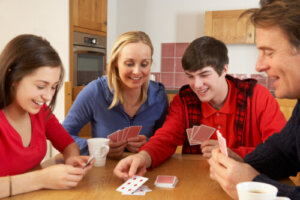3 Fun Games for Teens


Written and verified by the psychopedagogue María José Roldán
Today’s teens are often hooked on screens all day. For them, it’s something normal, so it’s the duty of parents to teach them other ways to entertain themselves and spend some time together. Today, we’ll share some ideas for fun games for teens.
Playing games in adolescence
For many, games seem to be an exclusive activity for the smallest members of the family. But the reality is that play is important at any stage of life and teens need that time to feel good about themselves.
According to a recent study, spending too much time in front of screens can decrease the psychological well-being of young people. For this reason, it’s crucial to promote a time to unplug and carry out some recreational activity with family or friends.
Some of the benefits of playing games for teens are the following:
- Improves social interaction
- Provides a time to rest from strict routines
- Encourage creativity and imagination
- Stimulates communication with other people
- Strengthens the affective bond with those people with whom they play
- It’s a great way to have a good time
Games go far beyond screens and the fun isn’t limited to video games. What’s more, games are necessary in order to teach teens that interactions between people around the game are fun and healthy. Also, when they get hooked on this activity, they forget that the internet exists for a long time.

Keep reading: Help Your Teen Take a Break
Fun games for teens
Next, we’re going to share with you 3 game ideas for teenagers that don’t require great resources or money investments. All you need is wit, which is what makes them so fun. Take note!
1. The phone game
This game is a classic and the laughs are guaranteed. It’s best when played in teams. However, you can ignore this rule if you don’t have a lot of players.
The methodology of the game consists of pronouncing a phrase in the ear of the first player–the more complicated it is, the better! This player then passes the message to the next player and so on until the last player receives it and says it out loud. When you notice the differences between the opening phrase and the ending phrase, laughter will spread throughout the house!
If you play the game in groups, the team that makes the fewest mistakes in transmitting the original message wins.
2. The movies
This classic game is also a lot of fun and, to play it, you need to divide into two or more teams.
A person running the game picks a movie and whispers it into a player’s ear. Then, this player must act out the movie so that the other players discover the title. The group that guesses it first wins.
3. Balderdash
This is a card game that only requires two players. The goal is to take turns tossing cards to the center of the table until both of you finish with the deck in your hands.
To play, each one must say the name of the card that they discard and place it face down on the table. If the opponent believes you, you take your turn. But, if they do¡n’t believe you, they’ll say “balderdash” and ask to turn the card over to find out if you’re telling the truth or not.
When a player lies and the deception is discovered, they must pick their card back up and add it to their deck. The first player who manages to get rid of their entire deck wins.
Learn more: 3 Tips to Manage Digital Stress in Children and Teenagers
Teens, let’s play!

These three games are simple but quite entertaining. If you wish, you can choose many others, but the fundamental thing is to show young people that there are different ways to have a good time.
Also, whenever possible, promote time spent outdoors and with the family, as the benefits of these types of activities are much more numerous than you think.
Today’s teens are often hooked on screens all day. For them, it’s something normal, so it’s the duty of parents to teach them other ways to entertain themselves and spend some time together. Today, we’ll share some ideas for fun games for teens.
Playing games in adolescence
For many, games seem to be an exclusive activity for the smallest members of the family. But the reality is that play is important at any stage of life and teens need that time to feel good about themselves.
According to a recent study, spending too much time in front of screens can decrease the psychological well-being of young people. For this reason, it’s crucial to promote a time to unplug and carry out some recreational activity with family or friends.
Some of the benefits of playing games for teens are the following:
- Improves social interaction
- Provides a time to rest from strict routines
- Encourage creativity and imagination
- Stimulates communication with other people
- Strengthens the affective bond with those people with whom they play
- It’s a great way to have a good time
Games go far beyond screens and the fun isn’t limited to video games. What’s more, games are necessary in order to teach teens that interactions between people around the game are fun and healthy. Also, when they get hooked on this activity, they forget that the internet exists for a long time.

Keep reading: Help Your Teen Take a Break
Fun games for teens
Next, we’re going to share with you 3 game ideas for teenagers that don’t require great resources or money investments. All you need is wit, which is what makes them so fun. Take note!
1. The phone game
This game is a classic and the laughs are guaranteed. It’s best when played in teams. However, you can ignore this rule if you don’t have a lot of players.
The methodology of the game consists of pronouncing a phrase in the ear of the first player–the more complicated it is, the better! This player then passes the message to the next player and so on until the last player receives it and says it out loud. When you notice the differences between the opening phrase and the ending phrase, laughter will spread throughout the house!
If you play the game in groups, the team that makes the fewest mistakes in transmitting the original message wins.
2. The movies
This classic game is also a lot of fun and, to play it, you need to divide into two or more teams.
A person running the game picks a movie and whispers it into a player’s ear. Then, this player must act out the movie so that the other players discover the title. The group that guesses it first wins.
3. Balderdash
This is a card game that only requires two players. The goal is to take turns tossing cards to the center of the table until both of you finish with the deck in your hands.
To play, each one must say the name of the card that they discard and place it face down on the table. If the opponent believes you, you take your turn. But, if they do¡n’t believe you, they’ll say “balderdash” and ask to turn the card over to find out if you’re telling the truth or not.
When a player lies and the deception is discovered, they must pick their card back up and add it to their deck. The first player who manages to get rid of their entire deck wins.
Learn more: 3 Tips to Manage Digital Stress in Children and Teenagers
Teens, let’s play!

These three games are simple but quite entertaining. If you wish, you can choose many others, but the fundamental thing is to show young people that there are different ways to have a good time.
Also, whenever possible, promote time spent outdoors and with the family, as the benefits of these types of activities are much more numerous than you think.
All cited sources were thoroughly reviewed by our team to ensure their quality, reliability, currency, and validity. The bibliography of this article was considered reliable and of academic or scientific accuracy.
- Tassia K. Oswald , Alice R. Rumbold, Sophie GE Kedzior, Vivienne M. Moore (Sep 2020) Psychological impacts of “screen time” and “green time” for children and adolescents: A systematic scoping review. Disponible en: https://journals.plos.org/plosone/article?id=10.1371/journal.pone.0237725
- By Twenge, Jean M.,Martin, Gabrielle N.,Campbell, W. Keith
Emotion, Vol 18(6) Sep 2018, 765-780. Decreases in psychological well-being among American adolescents after 2012 and links to screen time during the rise of smartphone technology. Disponible en: https://psycnet.apa.org/buy/2018-02758-001
This text is provided for informational purposes only and does not replace consultation with a professional. If in doubt, consult your specialist.








